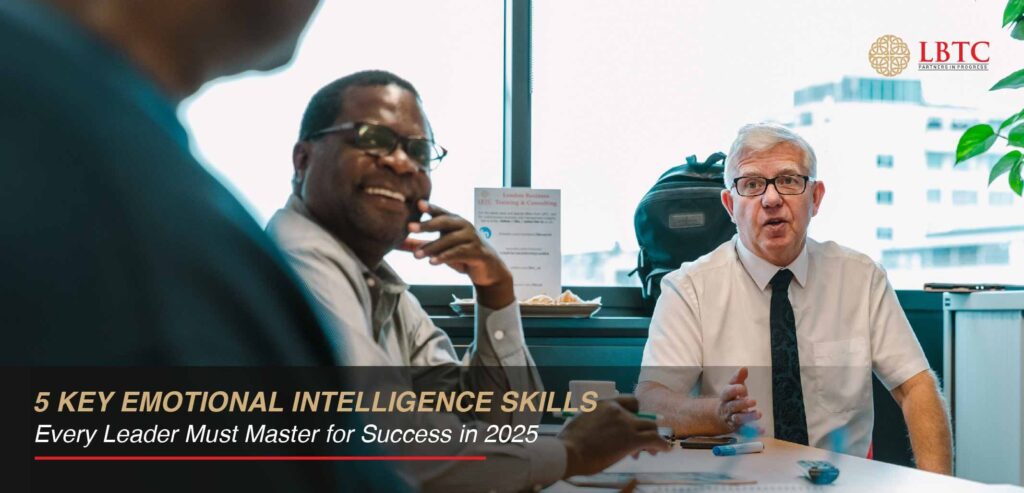
Emotional intelligence (EI) has reached new heights in the dynamics of workplace changes. Future workplaces will be characterized by a highly collaborative and empathetic professional world, with leaders possessing the critical skills of emotional intelligence. In 2025, individual success will be determined by these skills, team performance and the growth of the organization. Here are the five EI skills every leader must learn for effective leadership in the leadership course.
1.Self-Awareness: The Cornerstone of Leadership
Self-awareness refers to the ability to investigate and understand one’s own emotions and appreciate their tendency to affect one’s behaviour towards other people. It is a very important facet needed by leaders to be articulate and deliberate when deftly handling the complexities of situations.
How to Develop Self-Awareness:
- Ask for feedback: Courageously ask your colleagues, peers, and mentors for constructive feedback on your behaviour.
- Practice Reflection: Find time to journal or meditate to get to know the emotional triggers and responses that you have on a more personal level.
2. Empathy: Strong Bond Connections
In fact, there is no better means of learning than going through someone else experience. Empathy helps create trust and loyalty among team members. Empathetic leadership courses enable leaders to create spaces for employees to feel open, valued and heard.
Strategies to Develop Empathy
- Practice Perspective-taking: Make it a practice to regularly step into the shoes of your teammates to appreciate their challenges.
- Promote Open Communication: With Open Opportunity, allow your team colleagues to establish safe havens to talk about their thoughts and feelings.
- Connection Between Engagement and Empathy: It has also been found through recent studies that an empathetic leader forms a more preoccupied workforce as the legitimate emotional concern related to the well-being of the team results in high morale and productivity.
3. Emotional Regulation: Staying Calm Under Pressure
This describes how a person manages and controls his or her emotional responses in times of crisis. This skill enables leaders to breathe during crises, think logically, and inspire confidence among their teams.
Techniques for Effective Emotional Regulation
- Pause Before Reacting: Take a breath and consider before responding.
- Develop a Resilience Plan: Learn stress management techniques like exercise and mindfulness and adopt them into your routine.
4. Active Listening: The Key to Meaningful Communication
Active listening refers to concentrating one hundred per cent on what someone else says with understanding in order to reply to it later. This is a very important skill an “active” leader should possess.
Tips to Enhance Listening Skills
- Avoid distractions: Don’t multitask so you can really be present to hear the speaker.
- Paraphrase for the sake of clarity: Learn to report back to the speaker’s specific points.
Active listening builds team morale and creates a culture of respect. Employees feel valued, which brings further ease to collaboration and reduction in misunderstandings
5.Conflict Resolution: Turning Challenges into Opportunities
There cannot be organizations where there is no conflict. However, there are differences among leaders in the way they handle it. The emotionally intelligent leader can transmute such conflicts into avenues for growth and development.
Methods of Conflict Resolution
- Early point to issues: Does not let a slight argument turn into such a fight.
- Focus on Interests, Not Positions: Move towards a solution that can satisfy and meet the basic needs of each participant.
An appropriate manager with EI could use an extremely heated resource conflict or argument to hold a very effectively run brainstorming session, arriving at a very creative solution, as well as good rapport with the parties concerned. Emotional intelligence in conflict resolution can be effectively grasped through the frameworks taught in leadership courses.
Conclusion:
Although mastering these five emotional intelligence skills- self-awareness, empathy, emotional regulation, active listening, and conflict resolution- can make quite a difference in a leader’s ability to inspire and motivate teams, such leaders will be visionaries making things happen as workplace dynamics change most by 2025. If an individual finds it challenging to develop these skills, it is important to take leadership courses to acquire these abilities and become effective leaders.
What do you think of emotional intelligence in leadership? Have you witnessed such skills being exercised? Leave your comments below!

Leave a Reply